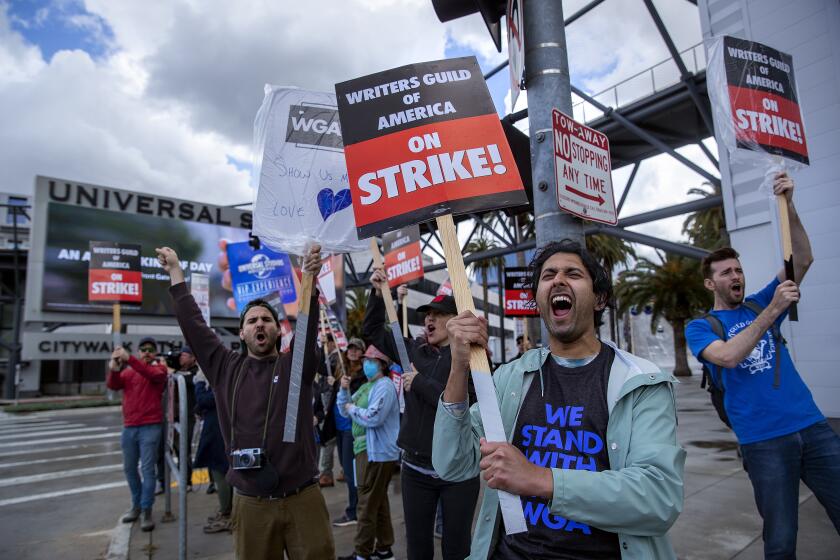‘It was a trauma’: Now that the strike has ended, showrunners wonder how they begin moving forward
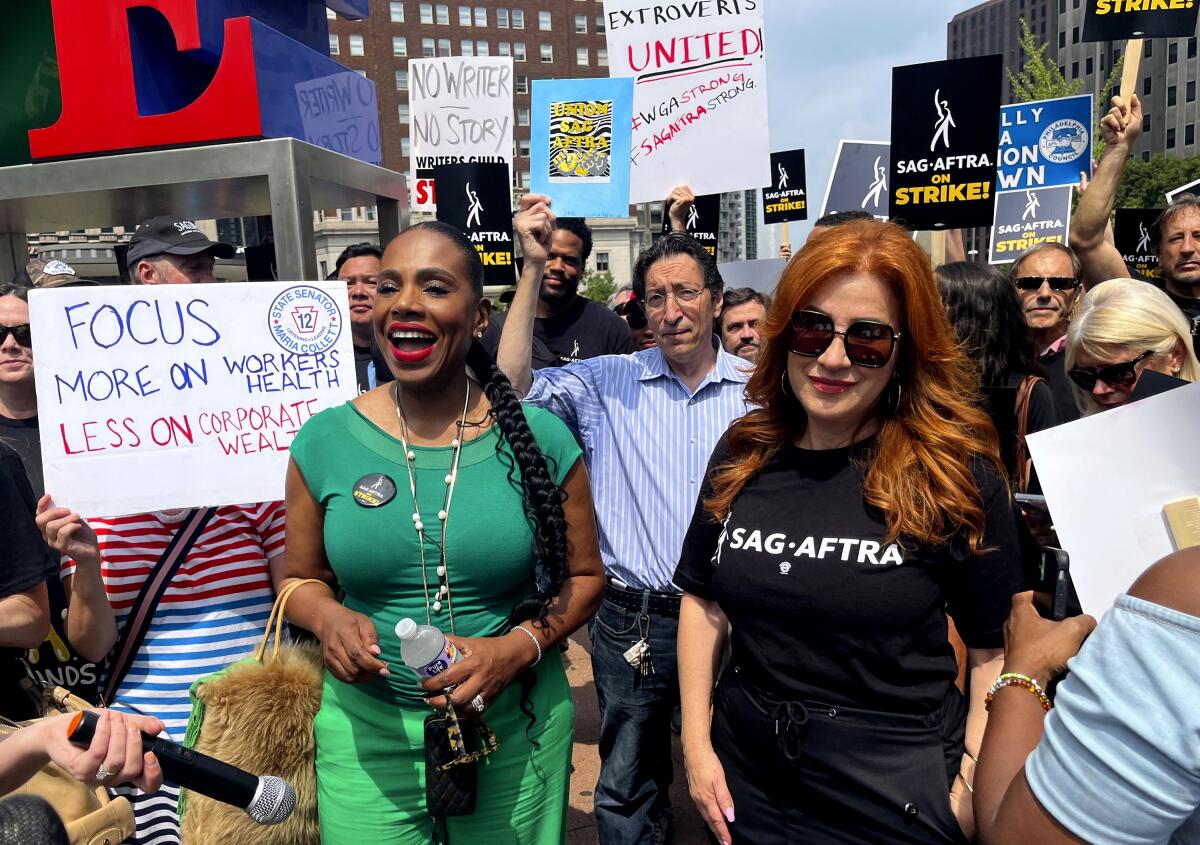
- Share via
Bruce Miller, longtime showrunner of “The Handmaid’s Tale,” was in the backyard of his Studio City home on Sunday, reviewing hypothetical workflow timelines for the sixth and final season of the dystopian drama when news broke that the Writers Guild of America and Hollywood studios had reached a tentative agreement to end a bruising, nearly five-month-long strike.
In the preceding days, anticipation had built steadily as news reports and online chatter signaled that a deal between the WGA and the Alliance of Motion Picture and Television Producers, which bargains on behalf of the big entertainment companies, was close. In Miller’s case, a year has passed since “The Handmaid’s Tale” premiered its fifth season on Hulu, and he wanted to be ready if the time had come to pick the pencils back up.
“I was trying to get the math down,” he said. “What if we had to start the room next year? And, like, OK, where were we last season? I was thinking worst-case scenario and best-case [scenario].” (While Miller passed showrunner duties for the show’s final season on to longtime writers and executive producers Eric Tuchman and Yahlin Chang, he remains an active figure in its swan song season.)
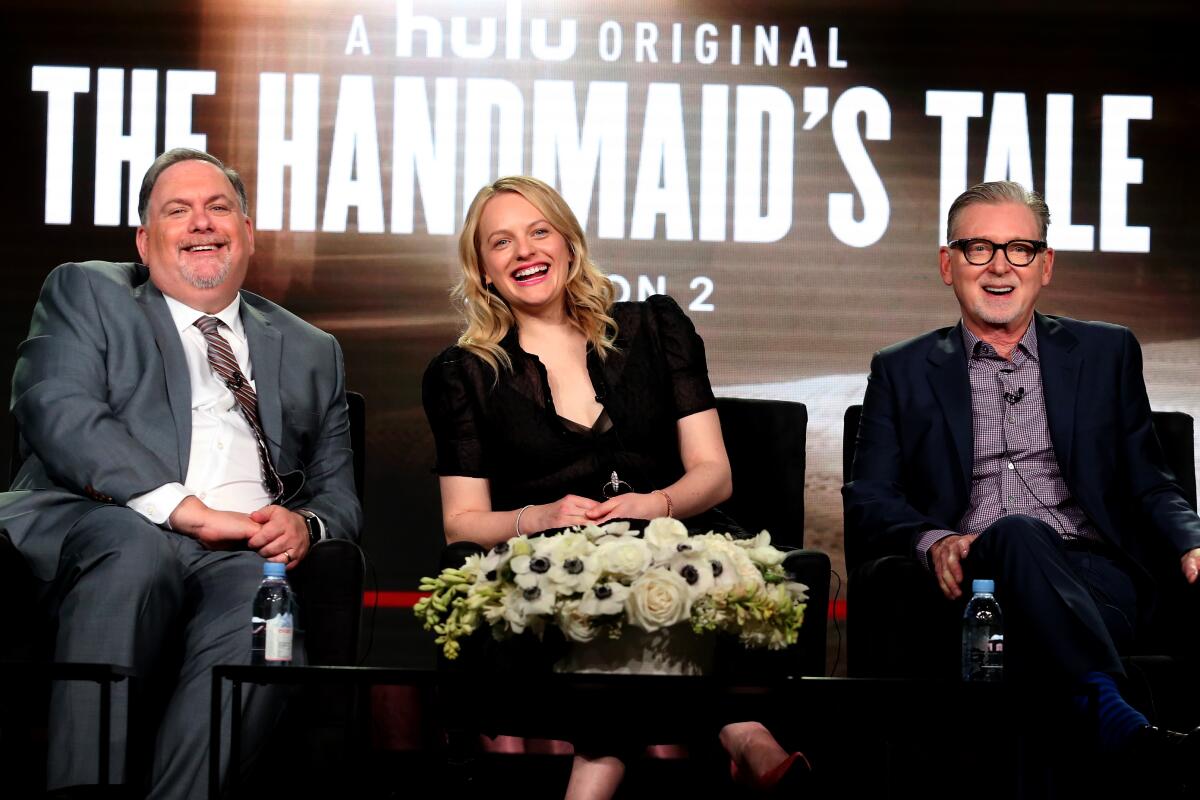
By Tuesday evening, as details of the new contract were made public and leaders of the WGA voted unanimously to end the strike, allowing television and movie writers to return to work on Wednesday, “best-case scenario” suddenly seemed possible. As guild members reviewed the terms of the three-year agreement in advance of a ratification vote, they quickly voiced their approval for the resulting gains on social media: “In a word, this deal is EXQUISITE,” Natasha Rothwell, who has worked on “Insecure” and “White Lotus,” wrote in a post on X, formerly Twitter; writer and actor Robin Thede (“A Black Lady Sketch Show”) posted, “Wow! This WGA deal is INCREDIBLE.”
For many of the top showrunners and writers working in Hollywood today, the events of the past few days have produced an outpouring of emotion — happiness and relief — but also concern for their colleagues, fear of the future and even a sense of loss as a defining moment for the profession comes to a close after nearly 150 days of formidable solidarity.
The 2023 WGA strike lasted 148 days, making it one of the longest work stoppages in Hollywood history. Why did it last so long?
“I’m surprised that I am so emotional; I’ve been doing this a very long time,” Miller said. “I know so many of the people who are going to be affected by the changes, and it’s emotional to feel like we made progress in a way that I think will help the entire industry feel a little more stable for the next three or four years so that we can make great television. The concern, honestly, for someone in my position is for the people I work with. I’m very lucky in terms of my financial position, and I understand that. That relief, for them, is what I felt when the news broke.”
“I don’t think there is a single person who works in television,who didn’t feel the effects of how the landscape has changed,” said Liz Tigelaar, showrunner of Hulu’s “Tiny Beautiful Things.” “I did believe that the strike would have the potential to go on for a long time, meaning that the writers would and could not acquiesce on what was important because it just felt like if that happened, writers as the heart of television, to me, would be gone. It just felt like there’s no way to give up because if we give up this, we give up everything.”
Justin Halpern, co-showrunner of ABC’s “Abbott Elementary,” said he had every confidence that the negotiating committee would stand firm in what it had to deliver to satisfy the needs of the membership.
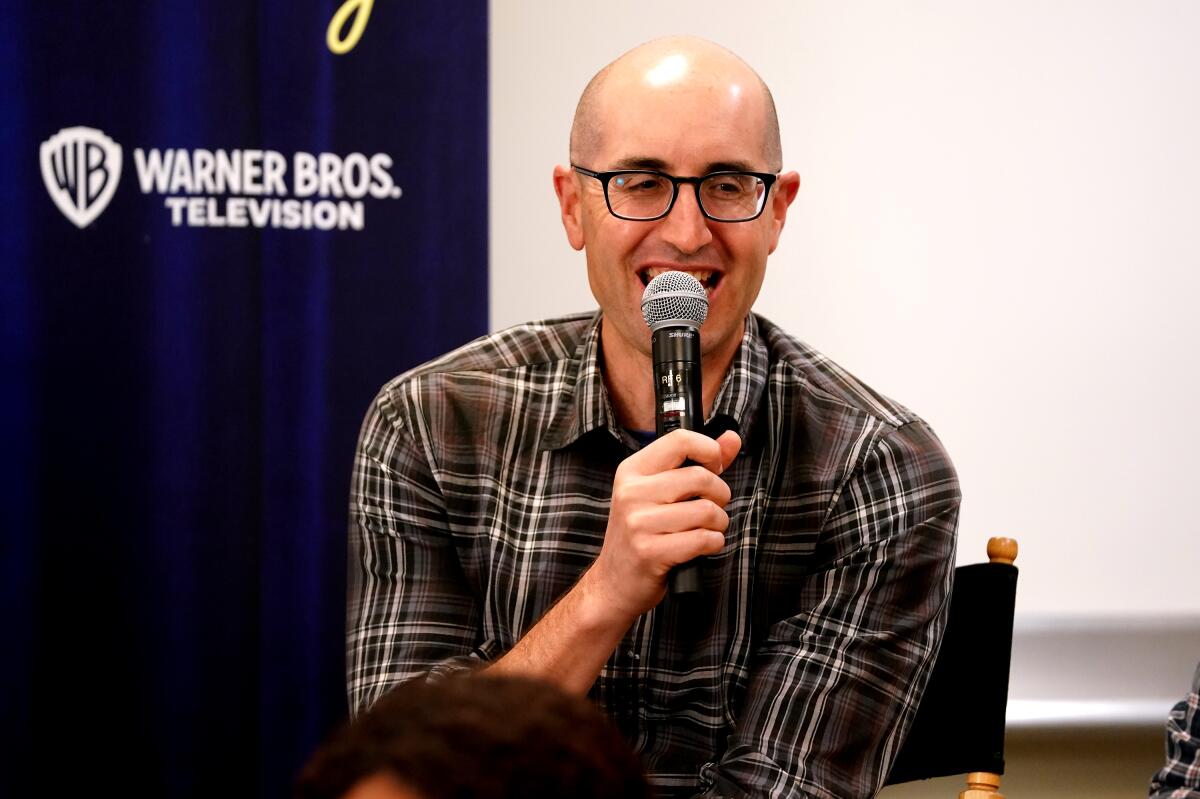
“When we started this, we had sort of a mission statement, which was, ‘We want writers to be able to make enough money to live and work in Los Angeles,’” Halpern said. “Every one of these policies and proposals is there to make sure that writers can make their year, because that was disappearing.”
The seven-page contract summary document, which was distributed to the WGA’s 11,500 film and TV writer members on Tuesday, outlined increases in wages and residuals, minimum staffing requirements in television writers rooms, payments based on the success of streaming shows and protections on artificial intelligence. The tentative contract includes enhancements worth an estimated $233 million annually, according to the guild. (When bargaining began in the spring, the WGA estimated that its proposals would gain writers about $429 million a year; AMPTP’s offer came out to approximately $86 million.)
Still, the extent of the ripple effects of the deal remain to be seen. While programming was being scaled back before the strike, some writers say they fear the cost-cutting is likely to accelerate in its aftermath, namely through the culling of series, now that studios will be paying writers more. In the hours after a tentative deal was announced, Starz canceled three original series — wrestling drama “Heels,” comedy “Run the World” and dramedy “Blindspotting” — and it scrapped another, “The Venery of Samantha Bird,” which had not yet aired and stopped production when the WGA strike began in May. It’s a sobering reminder that members of the guild are returning to different states of employment now that the strike is over.
“I’m in a very strange emotional state,” said Dailyn Rodriguez, showrunner of Netflix’s “Lincoln Lawyer” and a member of the WGA West board of directors. “This was very traumatic. I am very lucky because I get to go back to work; my show was picked up for a third season. My situation is not the same as other people. Some people are now like, ‘I go back to what existed before the strike, and pounding the pavement and trying to get a job. And what does that mean? Is there going to be a contraction in the business after this?’ Inevitably, there might be. We don’t know yet.”
“We’re coming out of not just being out of work,” Halpern said, “but this ‘existential threat’ kind of feeling for five months and this weight and pressure and this feeling of worry in a way that’s different than worrying about where your next job is gonna come from, which is already stressful. It’s kind of incredible because it was such a communal experience we were all having — it was just exhaustion, but also joy that we have achieved something that is really important to our membership and to the nature of our membership. I feel proud and sad and worried and nervous and happy. Kind of everything. My wife was like, ‘Are you OK?’ And I’m like, ‘Yes and I don’t know.’”
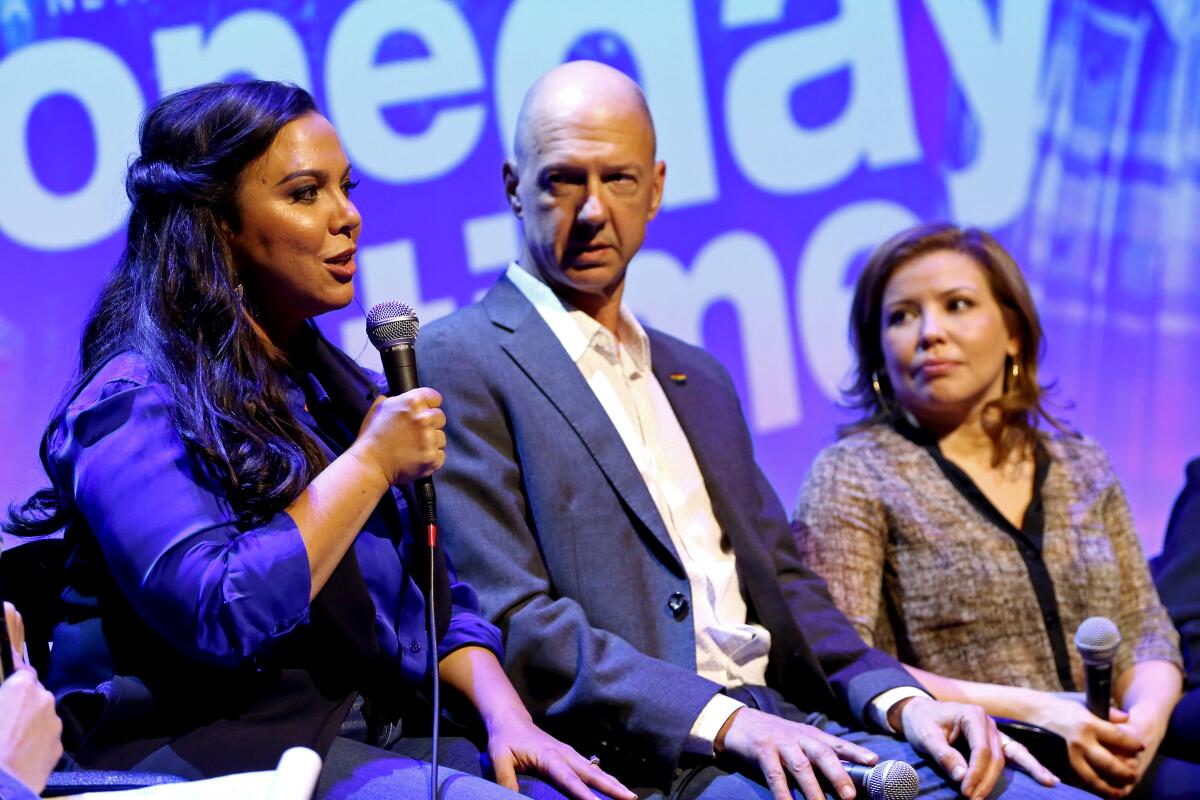
“It was a trauma for the whole community,” as Gloria Calderón Kellett, showrunner of Amazon’s “With Love,” described it. “It’s like whiplash in this moment. It’s still kind of hard to wrap my brain around. Once I’m really back to it, maybe I’ll feel it more. I’m not elated yet. The relief has not come yet to my body. I feel like I’m holding my breath. It’s ‘on your mark.’ We’re not running yet.”
After transforming the sidewalks outside of major Hollywood studios into hubs of picketing activity nearly every weekday morning since May, building friendships, forming a support system, and hearing one another’s stories, writers are also contending with the disorienting loss of a potent collective experience.
“I just spent 140-plus days trying my best to be positive for other members, to comfort other members, answer questions and be there and support people, and it was a lot,” Rodriguez said. “Maybe I’ll feel better as more time passes. I just feel like this was very stressful, really emotional. But it was also beautiful and amazing. I have met so many wonderful people on that picket line — people I never would have met. I reunited with people I haven’t seen in years. I’ve had moments of hilarity and joy and deep despair. I feel a little numb. Underneath it, I feel happiness, but I can’t seem to touch that emotion right now. I feel pain and sadness for people that had to forgo paychecks, not just our membership, but SAG and IATSE and Teamsters and other people touched by business. So, it’s complicated.”
One of the long-term benefits of those connections, of course, is a deeply united and empowered workforce, something that studios will have to contend with in the future.
“There’s a certain amount of anger and energy we’re coming back with,” said Tanya Saracho, who was the showrunner of Starz’s “Vida.” We’re not going to take the ‘no’ as easily. We have, for nearly five months, realized our worth. Together.”
“We shared stories,” Calderón Kellett said. “We talked to each other on those picket lines. I’m on three different showrunner WhatsApp groups. We are sharing information and also saying, ‘Wait, why are we not in solidarity pushing back on this as well?’ ‘Why are we putting up with this?’ There’s a way to do this work that makes everyone money and that means we can all live lives. There’s a more humane way to do all of it. And it has made us really take a moment to reflect on that.”
Now comes the work of reestablishing a sense of alliance with studios after months as adversaries.
“I don’t know how we’re going to go back and sit, in a Zoom or conference room, and trust our studio partners,” Saracho said. “I don’t say that to suggest I am incapable. I’m just wondering what that’s going to look like. There was a lot of damage done in the stuff that was said and in how long this lasted — not taking us seriously for months and waiting it out. How do we build up the trust again? It was a pretty nasty almost-divorce and now we’re staying together. We need to heal this.”
While writers are able to return to work this week, and some network shows, including NBC’s “The Tonight Show Starring Jimmy Fallon” and CBS’ “The Late Show With Stephen Colbert,” will return to the air within days, much of Hollywood remains at an impasse. Actors represented by SAG-AFTRA, who hit the picket lines in mid-July, are still on strike, but they are scheduled to meet with the AMPTP on Monday. Writers are hoping the WGA’s deal can provide actors the momentum to reach a resolution soon. The Writers Guild encouraged members to join the actors’ picket lines this week in a show of solidarity before returning to work.
The first shows to walk at the start of the Writers Guild of America will be the first to return, with staffs cranking out gags as soon as next week.
“I’m really sorry that it took 140-plus days for CEOs to come to the table and really do something,” said D.J. Nash, creator of ABC’s “A Million Little Things,” who served as a strike captain. “It’s really unfortunate because there are so many people who’ve been hurt by this. I hope that they can take that same energy and get SAG-AFTRA settled quickly, and I hope we can get back to work.”
For now, whether there’s a job waiting or one to go after, film and TV writers are at least closer to feeling a state of normalcy, like the excitement (or dread) of a blank screen again. That first day of school-like feeling is a welcome development.
“It’ll be really good,” Halpern said, his voice cracking, when asked about resuming work on “Abbott Elementary. “It’ll be really good to make it again.”
After a beat, he continued.
“Part of what’s making me so excited in thinking about going into the ‘Abbott’ writers room is knowing how much they’ll all make fun of me if they read that I got choked up in an L.A. Times interview.”
More to Read
The complete guide to home viewing
Get Screen Gab for everything about the TV shows and streaming movies everyone’s talking about.
You may occasionally receive promotional content from the Los Angeles Times.
